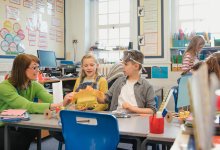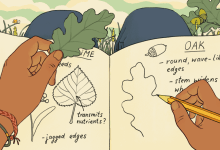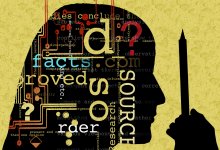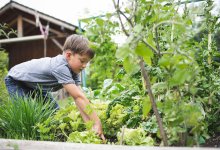Science
Explore and share tips, strategies, and resources for helping students develop in science.
What the Snowshoe Hare Teaches Us About Integrated Science Units
A middle school science teacher redesigned her life science curriculum as interconnected units anchored in real-world phenomena.Exploring Before Explaining Sparks Learning
New elementary science teachers can build student engagement and enhance learning by using the explore-before-explain approach.Your content has been saved!
Go to My Saved Content.Tracking Growth as a Teacher With a Journal
Adding notes and sketches in a reflection journal can be an enjoyable way to process information and record observations.Why Kids Should Nature Journal at All Grade Levels
A 2023 review makes a strong case that hands-on observation of natural phenomena has both academic and psychological benefits.7 Nature Experiments to Spark Student Curiosity
Encourage your students to ask questions about and explore the world around them with these hands-on lessons.Why Students Should Write in All Subjects
Writing improves learning by consolidating information in long-term memory, researchers explain. Plus, five engaging writing activities to use in all subjects.19.1kYour content has been saved!
Go to My Saved Content.The Powerful Benefits of Nature Journaling
Bringing students outdoors to draw and take note of natural surroundings creates space for curiosity—while encouraging deeper comprehension.Applying Literacy Standards Across Content Areas
High school teachers in all classes can help students strengthen their reading, writing, speaking, and listening skills.Designing Science Inquiry: Claim + Evidence + Reasoning = Explanation
The Claim, Evidence, Reasoning framework is a scaffolded way to teach the scientific method.30.3kYour content has been saved!
Go to My Saved Content.Teaching the Concept of Equity Through Gardening
Plants can illustrate how different people need different things to be nourished—and how equality and equity differ.9.7kYour content has been saved!
Go to My Saved Content.How Sketching Supports Learning in Science
When high school students patiently sketch something like the growth of a plant over time, they learn skills that go beyond science.Why Science Class Is the Perfect Place to Build Language Fluency
From word walls to peer presentations, these classroom strategies help students thrive as scientists and English learners.432Your content has been saved!
Go to My Saved Content.How to Set Up Formative Assessments for Summative Success
Assessing students’ learning during a class or project can help you adapt your teaching and guide them to meet their goals.258Your content has been saved!
Go to My Saved Content.Guiding Students to Use AI to Build Science Writing Skills
By leveraging AI, teachers can boost students’ motivation to research and create innovative presentations.288Your content has been saved!
Go to My Saved Content.Encouraging Students’ Curiosity With Animal Observations
Observing animals provides an engaging way for students to build their critical thinking skills and curiosity.













